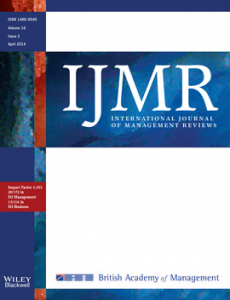
Quelle: Wikipedia
Eine Meldung in eigener Sache, über die wir uns sehr freuen:
Das International Journal of Management Reviews (IJMR) hat einen Beitrag von Sigrid Endres und Jürgen Weibler angenommen. Das IJMR zählt weltweit zu den Top 10 des Faches ( Platz 5 von 120 Zeitschriften in der Kategorie „Business“ und Platz 7 von 192 in der Kategorie „Management“).
In dem Beitrag geht es um eine Analyse und Fortführung der Entwicklung eines aktuellen Streams in der Führungsforschung. Dieser Stream baut auf der Grundüberlegung auf, dass Führung von anderen zugeschrieben werden muss und dass sich diese Zuschreibung durch fortlaufende Interaktionen (Gespräche, Projekte, gemeinsam Erfahrungen zwischen Vorgesetzten und Mitarbeitern) in Qualität und Intensität vor und in einem jeweils spezifischen Kontext verändert. Daraus folgt, dass Führung ein dynamischer Prozess und kein statischer Zustand ist. Anders formuliert: Was gewonnen ist, kann schnell verloren sein und eine missliche Lage muss nicht so bleiben.
Sigrid Endres; Jürgen Weibler: Towards a Three-Component Model of Relational Social Constructionist Leadership (RSCL): A Systematic Review and Critical Interpretive Synthesis, in International Journal of Management Reviews, 2016, DOI: 10.1111/ijmr.12095



